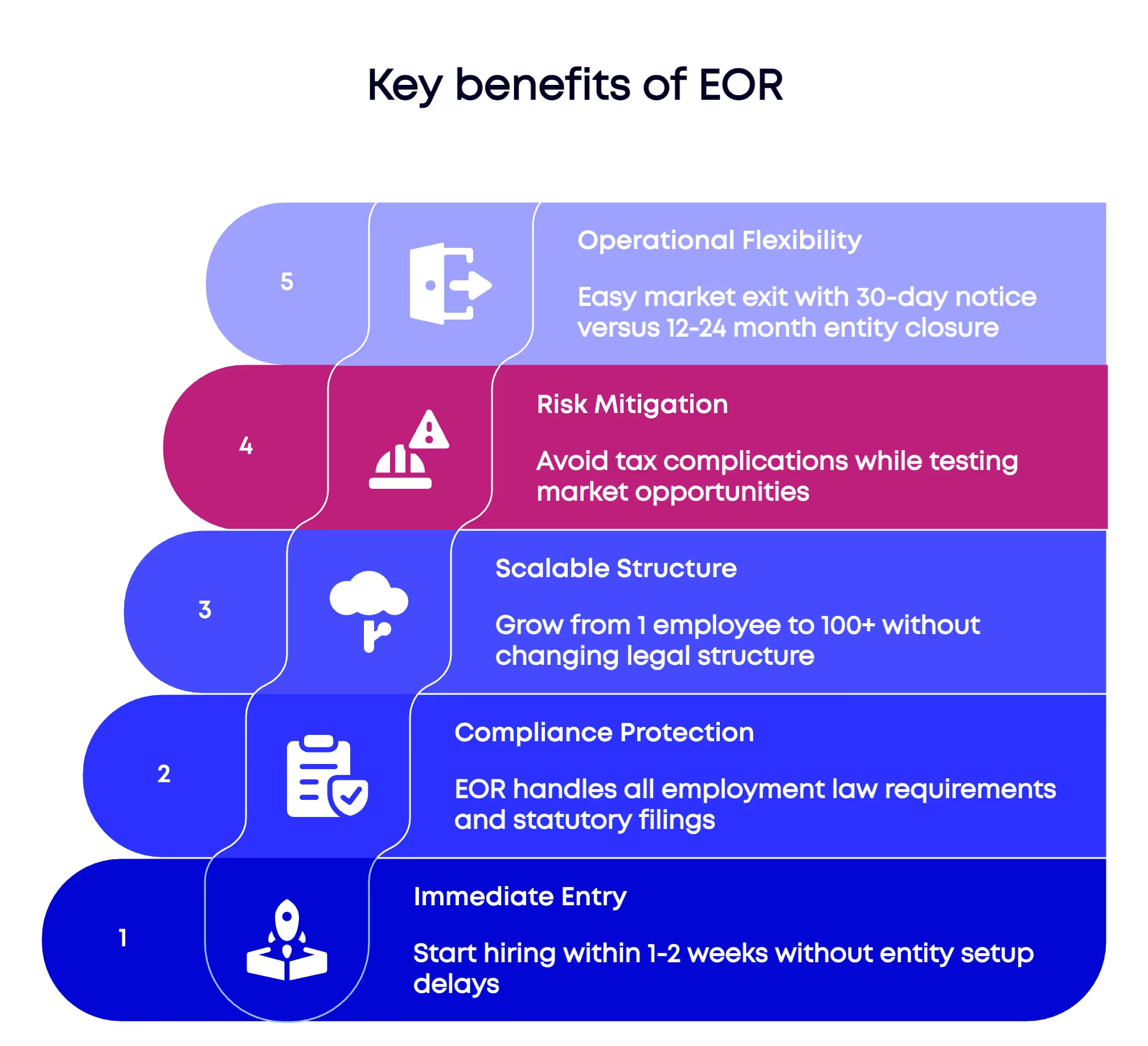Your board just approved the India expansion, and three different HR providers are pitching conflicting solutions.
One claims their PEO service is "perfect for India," another insists only EOR works, while the third offers both, but can't clearly explain the difference.
Meanwhile, your competitor just announced they're hiring their first Indian team next month.
This confusion costs companies real money. With India projected to become the world's 4th largest economy, global employers are racing to establish presence, but many stumble on the fundamental differences between PEO vs EOR in India.
We've guided many companies through this exact crossroads for more than 30 years. And we can certainly say that the differences between PEO and EOR in India aren't just regulatory nuances – they determine your entire market entry strategy.
This guide will clear up the confusion. So by the end of it, you'll know exactly which approach fits your timeline, budget, and growth plans.
PEO vs EOR in India: Side-by-Side Breakdown
Most executives waste weeks comparing solutions that aren't even legally comparable. Here's the reality: PEO vs EOR India isn't about choosing between two similar services – it's about understanding which structure actually works within Indian law.
Pro Tip: The "speed-to-hire" difference often determines whether you secure top talent or lose them to competitors offering faster onboarding.
We've seen many companies lose game-changing hires simply because their chosen model required months of setup while competitors using EOR started immediately.
PEO vs EOR in India: The Truth Global Employers Need to Know
What is PEO in India?
Here's what shocked our first-time India clients: traditional PEO services legally cannot exist in India. Most companies discover this after weeks of research and multiple vendor calls.
Traditional PEO operates on co-employment – your company and the PEO share employer responsibilities. Indian employment law prohibits this structure entirely.
India requires one legal employer per worker, period. No shared responsibility, no co-employment arrangements.
So what happens when providers advertise "PEO in India" services? You'll find two scenarios:
- EOR services disguised as PEO marketing (most common scenario)
- Administrative support for your existing Indian entity (true HR outsourcing)
The compliance implications are significant. If you attempt co-employment without understanding Indian law, you risk:
- Employment law violations
- Tax compliance issues
- Liability exposure for your global entity
Many international providers use "PEO in India" terminology because it's familiar to global audiences. But scratch beneath the surface, and they're actually providing EOR services through their Indian subsidiary.
Your alternatives are clear: set up your own entity (then potentially use payroll services), or partner with an EOR.
What is EOR in India?
An Employer of Record becomes the legal employer for your Indian workforce while you maintain complete operational control. Think of it as having a local employment infrastructure without the complexity of building one yourself.
Think of it this way: when you hire through our EOR services in India, we become the legal employer while you maintain day-to-day management. Your new hire receives a compliant Indian employment contract, proper benefits, and statutory protections—all without you establishing a local entity.

EOR eliminates the entity setup bottleneck while maintaining full legal compliance - exactly what growing companies need. This becomes particularly valuable when you consider why India has become such a compelling destination for global businesses.
The employment law complexities alone require specialized expertise that most companies simply don't have internally.
What Exactly Does an EOR in India Do for Your Business?
Most companies think EOR means "fancy payroll service." That misconception costs them competitive advantages they didn't know existed.
But quality EOR services transform your entire Indian operations capability - from legal compliance to employee experience.
The global EOR market is projected to grow from $4.7 billion in 2025 to $7.8 billion by 2033, reflecting the increasing adoption of flexible hiring solutions that go far beyond basic payroll processing.
Here's what comprehensive EOR actually delivers:
Legal employment and compliance
Your biggest risk in India isn't finding talent – it's employment law violations that could derail your entire expansion. Professional EOR providers become your legal compliance shield, handling every regulatory requirement from contract drafting to termination procedures.
Leading EOR services manage:
- Employment contract creation per current Indian labor standards
- Multi-state compliance across India's varying employment regulations
- Statutory registration for Provident Fund, ESI, and professional taxes
- Labor law adherence, including working hours, overtime, and leave policies
Professional EOR services include expert legal compliance navigation that ensures your team operates under bulletproof legal frameworks from day one. That’s why companies using EOR services avoid costly compliance penalties that can reach thousands of dollars per violation.
Pro Tip: Indian employment law varies significantly by state. What's compliant in Karnataka might violate Maharashtra regulations. Top EOR providers manage these nuances automatically.
Payroll and tax management
Indian payroll complexity makes US tax codes look simple by comparison. EOR providers transform this administrative nightmare into seamless monthly processing that employees and finance teams love.
.avif)
HR support and employee lifecycle
Great talent demands a great employee experience. And EOR platforms create a professional, responsive environment that attracts and retains India's best performers.
Complete lifecycle management includes:
- Streamlined onboarding with digital document collection and verification
- Performance management support aligned with Indian cultural expectations
- Benefits administration including health insurance and wellness programs
- Professional offboarding ensuring proper documentation and knowledge transfer
- Local HR expertise providing culturally appropriate employee support
- Technology platforms enabling employee self-service capabilities
EOR in India vs Setting Up Your Own Entity
Once you understand EOR benefits, the natural question becomes: Should you eventually set up your own Indian entity?
Many companies assume EOR is just a temporary solution, but the reality is more nuanced. Some businesses thrive on EOR indefinitely, while others transition to entities for strategic reasons.
EOR works brilliantly when you're testing the waters or need immediate results.
Companies hiring their first 1-20 Indian employees typically find that EOR delivers everything they need without the administrative burden. You get to focus on building your team and growing revenue while someone else handles the regulatory complexity.
With 28.2% of Indian employees now working hybrid models, EOR aligns perfectly with remote-friendly hiring approaches. It's perfect for startups hiring their first few developers or established companies exploring Indian talent pools.
Setting up your own entity starts making sense once you hit certain scales.
If you're planning to hire 50+ people, generate significant local revenue, or need to sign contracts directly with Indian customers, the math starts favoring entity formation. You get complete control over policies, branding, and operations.
Cost Comparison: EOR in India vs Legal Entity
Getting the complete financial picture means looking at both direct costs and hidden expenses. Many companies focus only on monthly fees while overlooking setup investments, operational overhead, and opportunity costs that dramatically impact total ROI.
Upfront costs
EOR services require minimal initial investment, typically $0-$500 in setup fees per employee. You can start hiring within days without major capital requirements or lengthy approval processes.
Entity establishment hits your budget hard upfront.
Legal incorporation, government registrations, office deposits, and professional services typically cost $15,000-$40,000. Plus you'll wait 2-3 months before you can hire anyone.
Ongoing costs
EOR services typically run $300-600 per employee each month, covering payroll, compliance, HR support, and legal protection. The pricing is straightforward - you know exactly what you're paying for.
Running your own entity involves multiple cost categories:
- Local staff for administration: $1,500-3,000 monthly
- Compliance and accounting help: $800-2,000 monthly
- Office space and utilities: $1,000-5,000 monthly depending on location
- Software and systems: $300-800 monthly
Hidden costs can also surprise you: mandatory annual audits ($2,000-5,000), penalties for compliance mistakes, and the management time your team spends on administrative tasks instead of growing the business.
Summing Up
We've covered a lot of ground – from legal frameworks to cost comparisons, hiring approaches to partner selection. The reality is clear: India offers tremendous opportunities, but the path forward requires making smart decisions about structure, compliance, and execution.
Here's what separates successful Indian expansions from expensive mistakes: Companies that succeed don't try to figure everything out alone. They partner with experts who've already solved these problems hundreds of times.
We've built the complete infrastructure you need: EOR services for immediate hiring, legal compliance that keeps you protected, talent acquisition that finds the right people fast, payroll management that handles every detail, and HR support that keeps employees happy.
The India opportunity won't wait for perfect timing. Your competitors are already building teams there. The question isn't whether to expand into India, but how quickly you can do it right.
FAQ about PEO vs EOR
What is the difference between EOR and PEO?
EOR acts as the complete legal employer for your workforce, while PEO operates through co-employment models. EOR enables global hiring without local entities, whereas PEO requires your own company first. EOR assumes all compliance responsibility and risk, while PEO arrangements typically share responsibilities between parties, creating potential liability gaps.
Is EOR legal in India?
Yes, EOR in India is completely legal and widely adopted by global companies. EOR services operate under standard Indian employment and contract law frameworks. Many Fortune 500 companies use EOR for Indian expansion.
What is PEO in India?
Traditional PEO models don't legally exist in India's regulatory framework. Companies advertising "PEO in India" services actually provide EOR solutions under different marketing terms. Indian employment law doesn't support co-employment structures between foreign companies and local providers.
What is the difference between a PPO and EOR?
PPO typically refers to payroll processing organizations that handle administrative tasks only. EOR provides comprehensive employment services extending far beyond payroll processing. PPO focuses on transaction processing while you remain the legal employer. EOR includes legal employment, compliance protection, and complete risk assumption for Indian operations.
.webp)
.avif)





